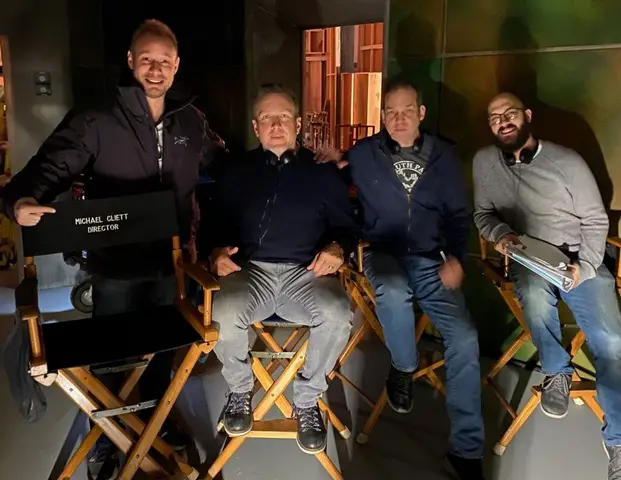In the early 2000’s, Michael Cliett was a flight attendant for American Airlines. While it was a solid career at the time, Cliett wasn’t satisfied. With an outside fascination in special effects and animation, along with a tragic event that changed our country forever, Cliett was forced to make a decision.
“9/11 happened and I found myself furloughed from the airlines and in a major rut,” Cliett said. “One night while sitting in my apartment watching TV, an ad for The DAVE School came on. I had always thought of myself as more of a creative and artistic thinker as well, and so I thought this might be something I could be good at. It really excited me and I felt hope for the first time in a long time. I called the school the next day.”
After calling DAVE School, Cliett filled out the application and took the tour of the school’s campus. From the setup of the campus in the backlot of Universal to seeing the abilities of what a student could do with a 3D model on their screen, he was blown away.
“I can’t describe the feeling I had being there, but I’ll never forget it,” Cliett said. “It felt like I belonged. I made the decision right then and there to attend DAVE School and started classes about a month later.”
During Cliett’s time at DAVE School, he learned the art of visual storytelling and how VFX assists in telling or even being the story. From storyboards, to previsualization, to the final composite, DAVE School prepares its students for the VFX industry. Cliett also credits the collaborative studio environment that DAVE School provides to preparing students for the VFX industry. “Every step of the VFX film making process I learned at the school” said Cliett. “Those learned attributes helped me and carried over directly into my career as a VFX artist.”
After his time at DAVE School in 2004, Cliett landed his first job at Zoic. He worked on the movie ‘Serenity’ as a VFX Generalist animating spaceships. Since becoming full-time in the VFX field, Cliett has been no stranger to big projects. “I’ve worked on Serenity, Jericho, multiple commercials, CSI, Almost Human, King Arthur, Premium Rush and more,” Cliett said. “Most recently though I’ve been the VFX Supervisor/Producer for 6 seasons of “The 100” for Warner Bros.” With all of his experience in VFX, Cliett was looking for a new challenge. He recently made his directorial debut on the show ‘The 100.’
With the collaboration of a good VFX team, maintaining focus, and his experience as VFX supervisor, Cliett’s debut was a success. “You’re only as good as the people around you,” Cliett said. “Knowing what would be needed in the edit beforehand in order to tell the story greatly assisted me on set in getting the shots I knew I would need in the edit room in post. I didn’t waste time shooting what wouldn’t be used and was confident in what I was getting which made for a great shooting day and kept the crew on my side.”
Cliett enjoyed his time directing, but also does not want to completely transition away from being a VFX Supervisor. “I love telling stories, and both positions enable me to be able to do that. I also am very interested in virtual production and might be venturing into that space a bit as well on the production side.”
As for his advice to current DAVE School students who want to work in the VFX industry, Cliett kept it simple. “Work hard, eat, sleep, and breathe this stuff,” Cliett said. “I guarantee you the ones who will be successful are doing just that. Don’t be afraid to try new things or think outside of the box and don’t get discouraged when you don’t figure it out right away. It takes time, just keep pushing forward and then network, network, network.”
For those who are deciding between going to school for VFX or jumping straight into the industry, Cliett believes it is an easy choice due to the hands on experience, collaboration, advice, and connections you have the opportunity to get at school. “One can learn a program or how to put a VFX shot together on their own, but what the school gives you is that and so much more,” Cliett said.
“How to work in a true studio with a team of artists and how to tell a story through visuals, those are only learned by actually doing and you get true hands on experience at the school. School will let you sample everything and enable you to hone in on what your best at and most enjoy. And finally the relationships one develops at the school can exponentially improve your chances of landing that dream job upon graduation.”
VFX Production Diploma
The Visual Effects Production diploma program gives students a broad range of skills which allows them to pursue jobs in the computer graphics industry, including feature film and television effects, game art, print advertising, architectural visualization and military simulation.*
VFX Production Degree
The Bachelor’s Degree in Visual Effects Production gives students a broad range of skills which allows them to pursue jobs in the computer graphics industry, including feature film and television effects, game art, print advertising, architectural visualization and military simulation.*
*These examples are intended to serve only as a general guide of possible employment opportunities. There are many factors that determine the job an individual may obtain and DAVE School cannot guarantee its graduate any particular job. Some positions may require license or other certifications. We encourage you to research the requirements for the particular position you desire.


